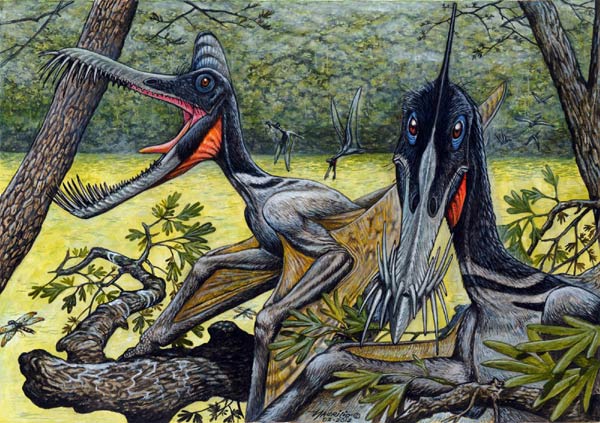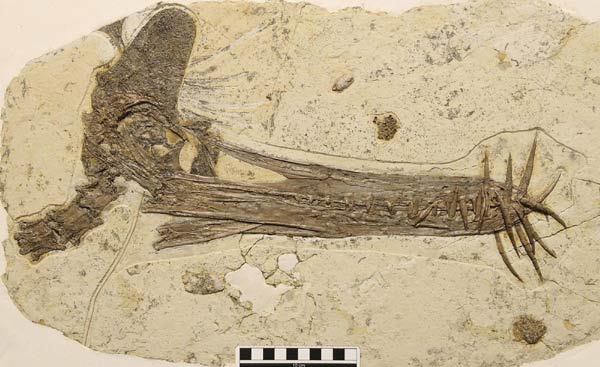Pterosaur fossil unearthed in China
Updated: 2012-03-24 16:53
(Xinhua)
|
||||||||
BEIJING - A rare pterosaur skull fossil has been discovered in Northeast China, according to a Friday press release from the Chinese Academy of Science (CAS).
 |
|
Pterosaurs in ancient times in this restoration photo, March 23, 2012. [Photo/Xinhua] |
A photo of the fossil specimen attached to the release shows that the creature had an upward-pointing frontal crest and large rostral teeth, indicating that it is closely related to Ludodactylus, another rare lizard hailing from the Araripe Basin in northeast Brazil, according to Dr Wang Xiaolin, a scientist leading a joint Chinese-Brazilian research team that discovered the fossil.
The team also discovered several coprolites containing fish bone fragments next to the skull, indicating that the creature mainly ate fish, the release said.
The reptile has been named Guidraco venator, a combination of Chinese and Latin that means "ghost hunter."
The specimen was unearthed from the Early Cretaceous Jiufotang Formation in Northeast China's Liaoning province, a region famous for the pterosaur fossils uncovered there.
 |
|
The specimen of a pterosaur skull fossile, file photo. [Photo/Xinhua] |
One possible explanation for the creature's resemblance to the Brazilian Ludodactylus states that several early Cretaceous pterosaur species may have originated in Asia and later migrated to other regions, such as Brazil.
"The occurrence of Guidraco is consistent with that hypothesis," said the study's coauthor Alexander Kellner from the Federal University of Rio de Janeiro (UFRJ).
Dr Wang said the pterosaurs may have been forced to leave the Jiufotang Formation due to rising competition with birds, which also prey on fish.
A report on the discovery will be published in the April issue of Naturwissenschaften, a leading academic journal for the natural sciences.

 Relief reaches isolated village
Relief reaches isolated village
 Rainfall poses new threats to quake-hit region
Rainfall poses new threats to quake-hit region
 Funerals begin for Boston bombing victims
Funerals begin for Boston bombing victims
 Quake takeaway from China's Air Force
Quake takeaway from China's Air Force
 Obama celebrates young inventors at science fair
Obama celebrates young inventors at science fair
 Earth Day marked around the world
Earth Day marked around the world
 Volunteer team helping students find sense of normalcy
Volunteer team helping students find sense of normalcy
 Ethnic groups quick to join rescue efforts
Ethnic groups quick to join rescue efforts
Most Viewed
Editor's Picks

|

|

|

|

|

|
Today's Top News
Health new priority for quake zone
Xi meets US top military officer
Japan's boats driven out of Diaoyu
China mulls online shopping legislation
Bird flu death toll rises to 22
Putin appoints new ambassador to China
Japanese ships blocked from Diaoyu Islands
Inspired by Guan, more Chinese pick up golf
US Weekly

|

|







